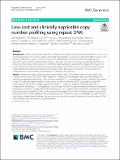Files in this item
Low-cost and clinically applicable copy number profiling using repeat DNA
Item metadata
| dc.contributor.author | Abujudeh, Sam | |
| dc.contributor.author | Zeki, Sebastian | |
| dc.contributor.author | van Lanshot, Meta | |
| dc.contributor.author | Pusang, M | |
| dc.contributor.author | Weaver, Jamie | |
| dc.contributor.author | li, X | |
| dc.contributor.author | Noorani, Ayesha | |
| dc.contributor.author | Metz, Andrew | |
| dc.contributor.author | Bornschein, Jan | |
| dc.contributor.author | Bower, Lawrence | |
| dc.contributor.author | Miremedi, Ahmed | |
| dc.contributor.author | Fitzgerald, Rebecca | |
| dc.contributor.author | Morrissey, Ed | |
| dc.contributor.author | Lynch, Andy | |
| dc.date.accessioned | 2022-08-22T11:30:12Z | |
| dc.date.available | 2022-08-22T11:30:12Z | |
| dc.date.issued | 2022-08-17 | |
| dc.identifier | 280336845 | |
| dc.identifier | 9cce626a-4804-447f-a746-c1a298e4959b | |
| dc.identifier | 85136026034 | |
| dc.identifier | 000842092000002 | |
| dc.identifier.citation | Abujudeh , S , Zeki , S , van Lanshot , M , Pusang , M , Weaver , J , li , X , Noorani , A , Metz , A , Bornschein , J , Bower , L , Miremedi , A , Fitzgerald , R , Morrissey , E & Lynch , A 2022 , ' Low-cost and clinically applicable copy number profiling using repeat DNA ' , BMC Genomics , vol. 23 , 599 . https://doi.org/10.1186/s12864-022-08681-8 | en |
| dc.identifier.issn | 1471-2164 | |
| dc.identifier.other | ORCID: /0000-0002-7876-7338/work/117568037 | |
| dc.identifier.uri | https://hdl.handle.net/10023/25869 | |
| dc.description | Funding for sample sequencing was through the Oesophageal Cancer Clinical and Molecular Stratification (OCCAMS) Consortium as part of the International Cancer Genome Consortium and was funded by a programme grant from Cancer Research UK (RG66287). SA was funded by Wellcome Trust award (RG73199). ERM was funded by MRC Computational Biology Fellowship (MC_UU_12025, MRC Strategic Alliance Funding: MRC Weatherall Institute of Molecular Medicine). | en |
| dc.description.abstract | Background Somatic copy number alterations (SCNAs) are an important class of genomic alteration in cancer. They are frequently observed in cancer samples, with studies showing that, on average, SCNAs affect 34% of a cancer cell’s genome. Furthermore, SCNAs have been shown to be major drivers of tumour development and have been associated with response to therapy and prognosis. Large-scale cancer genome studies suggest that tumours are driven by somatic copy number alterations (SCNAs) or single-nucleotide variants (SNVs). Despite the frequency of SCNAs and their clinical relevance, the use of genomics assays in the clinic is biased towards targeted gene panels, which identify SNVs but provide limited scope to detect SCNAs throughout the genome. There is a need for a comparably low-cost and simple method for high-resolution SCNA profiling. Results We present conliga, a fully probabilistic method that infers SCNA profiles from a low-cost, simple, and clinically-relevant assay (FAST-SeqS). When applied to 11 high-purity oesophageal adenocarcinoma samples, we obtain good agreement (Spearman’s rank correlation coefficient, rs=0.94) between conliga’s inferred SCNA profiles using FAST-SeqS data (approximately £14 per sample) and those inferred by ASCAT using high-coverage WGS (gold-standard). We find that conliga outperforms CNVkit (rs=0.89), also applied to FAST-SeqS data, and is comparable to QDNAseq (rs=0.96) applied to low-coverage WGS, which is approximately four-fold more expensive, more laborious and less clinically-relevant. By performing an in silico dilution series experiment, we find that conliga is particularly suited to detecting SCNAs in low tumour purity samples. At two million reads per sample, conliga is able to detect SCNAs in all nine samples at 3% tumour purity and as low as 0.5% purity in one sample. Crucially, we show that conliga’s hidden state information can be used to decide when a sample is abnormal or normal, whereas CNVkit and QDNAseq cannot provide this critical information. Conclusions We show that conliga provides high-resolution SCNA profiles using a convenient, low-cost assay. We believe conliga makes FAST-SeqS a more clinically valuable assay as well as a useful research tool, enabling inexpensive and fast copy number profiling of pre-malignant and cancer samples. | |
| dc.format.extent | 2090561 | |
| dc.language.iso | eng | |
| dc.relation.ispartof | BMC Genomics | en |
| dc.subject | Somatic copy number alterations | en |
| dc.subject | Copy number profiling | en |
| dc.subject | Cancer | en |
| dc.subject | Oesophageal adenocarcinoma | en |
| dc.subject | Barrett's oesophagus | en |
| dc.subject | Tumour purity | en |
| dc.subject | FAST-SeqS | en |
| dc.subject | Bayesian nonparametrics | en |
| dc.subject | Probabilistic model | en |
| dc.subject | Sticky HDP-HMM | en |
| dc.subject | MCMC | en |
| dc.subject | RC0254 Neoplasms. Tumors. Oncology (including Cancer) | en |
| dc.subject | DAS | en |
| dc.subject | SDG 3 - Good Health and Well-being | en |
| dc.subject.lcc | RC0254 | en |
| dc.title | Low-cost and clinically applicable copy number profiling using repeat DNA | en |
| dc.type | Journal article | en |
| dc.contributor.institution | University of St Andrews. School of Medicine | en |
| dc.contributor.institution | University of St Andrews. School of Mathematics and Statistics | en |
| dc.identifier.doi | https://doi.org/10.1186/s12864-022-08681-8 | |
| dc.description.status | Peer reviewed | en |
This item appears in the following Collection(s)
Items in the St Andrews Research Repository are protected by copyright, with all rights reserved, unless otherwise indicated.

